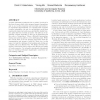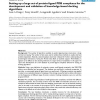230 search results - page 39 / 46 » Automation for Dependently Typed Functional Programming |
157
Voted
LICS
2009
IEEE
15 years 9 months ago
2009
IEEE
Game semantics describe the interactive behavior of proofs by interpreting formulas as games on which proofs induce strategies. Such a semantics is introduced here for capturing d...
119
Voted
ENTCS
2008
15 years 2 months ago
2008
This paper presents fixpoint calculations on lattice structures as example of highly modular programming in a dependently typed functional language. We propose a library of Coq mo...
223
Voted
GIS
2006
ACM
16 years 3 months ago
2006
ACM
Location information gathered from a variety of sources in the form of sensor data, video streams, human observations, and so on, is often imprecise and uncertain and needs to be ...
105
Voted
AFP
2008
Springer
15 years 9 months ago
2008
Springer
Workflow systems are automated systems in which tasks are coordinated by assigning them to either humans or computers. Contemporary workflow systems are static and not very flex...
107
Voted
BMCBI
2007
15 years 2 months ago
2007
Background: The number of algorithms available to predict ligand-protein interactions is large and ever-increasing. The number of test cases used to validate these methods is usua...


